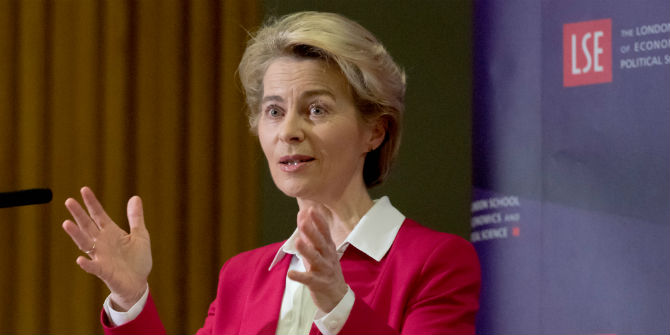 For Poland to oppose the reelection of Donald Tusk was a suicide attempt. Wojciech Przybylski writes that only the Prime Ministers from the three other Visegrad Group countries (Slovakia, Hungary, Czech Rep.) might have been able to save the day by claiming that Tusk was the candidate of Central Europe. In the end, however, Poland was outvoted 27-1. Furthermore, Warsaw’s row over the EU President put Prime mister May between a rock and a hard place – between further alienating Brussels and estranging one of the UK’s most sympathetic counterparts in the upcoming Brexit negotiations.
For Poland to oppose the reelection of Donald Tusk was a suicide attempt. Wojciech Przybylski writes that only the Prime Ministers from the three other Visegrad Group countries (Slovakia, Hungary, Czech Rep.) might have been able to save the day by claiming that Tusk was the candidate of Central Europe. In the end, however, Poland was outvoted 27-1. Furthermore, Warsaw’s row over the EU President put Prime mister May between a rock and a hard place – between further alienating Brussels and estranging one of the UK’s most sympathetic counterparts in the upcoming Brexit negotiations.
Donald Tusk, the former Polish prime minister, got re-elected as the President of the EU. Yet the final nail in the coffin of Poland’s EU diplomacy has been hammered home by Jaroslaw Kaczynński, the leader of Poland’s ruling Law and Justice party (PiS).
It is almost impossible to explain why Poland did not support the only possible candidate from Central Europe; especially since Warsaw has made this region a pivot of its foreign policy. This move was self-contradictory and, at first sight, improbable, but nonetheless might have effectively ended Donald Tusk’s career as the President of the EU. According to public opinion polls, the Polish people, who are by far the most EU-enthusiastic nation of the Visegrad group, preferred that Donald Tusk remained in his seat. Now they are starting to speculate on what else this government is capable of, while remembering the months-old announcement from Jaroslaw Kaczynski, which has just come true.
A verbal threat had been looming for many months but the general assumption was that Warsaw would not oppose the reelection if it came to a vote. What seemed to be just a diplomatic gamble before, has now become a dreadful reality. For Kaczyński, the opportunity to damage his old political rival was more important than any loyalty he might have to the Central European alliance. Kaczynski was risking that, instead of Donald Tusk, the EU may choose someone indifferent to the special interests shared by the Visegrad Group.
V4 press conference by Kancelaria Premiera, licensed under Public Domain Mark 1.0
Twisted logic
In fact, Poland’s Visegrad Group partners came in favour of the current president of the European Council. Sadly, the twisted logic of Poland’s leader has revealed itself once again. Earlier he claimed that he can live with lower GDP growth as long as his ideological plan is able to be implemented. However, the question remains what will happen in Poland after Donald Tusk was re-elected. Or perhaps more importantly, what he will be able to do without the domestic support of his presidency? Europe should brace itself, because this may boost the anti-EU sentiment – both in Poland and throughout the EU. At the same time, Tusk’s continued tenure in Brussels gives somewhat of a boost to moderate factions of the Polish political arena and society who oppose the current government.
Symbolic leader
Having a Polish president of the European Council is a symbolic anchor, helping everyone to believe that Poland is not all about Jaroslaw Kaczyński. Losing this post might have strengthened anti-EU factions, which currently only hold a minority. If anti-EU actors were to gain ground, nationalists, both in Poland and across Europe, would have used this occasion to signal how the EU elites are lacking in democratic legitimacy. However false this may be, it should not be underestimated especially before the crucial elections in France, Germany and the Netherlands. Furthermore, Poland’s row over President Tusk is a bad sign for the Brexit negotiations in so far as petty national politics can prove to be disruptive on a European scale.
Wojciech Przybylski is Editor-in-Chief of Visegrad Insight.
An earlier version of this article was first been published at EuObserver, it gives the views of the author, and not the position of LSE Brexit, nor of the London School of Economics.








“in so far as petty national politics can prove to be disruptive on a European scale”
You mean like someone taking it upon herself to invite every economic migrant in the world to come to Europe and then, when they came in their hundreds of thousands, having the nerve to insist that a percentage of them should be imposed on all other member countries whether those countries liked it or not?
You insinuated that Tusk was somehow a moderate! Far from it! His part in the regime that ruled Poland from 1989 to 2015 was mired in scandal, which has gone completely unreported in the heavily controlled press operations in Poland. Let’s leave the defrauding of billions of euros of real estate to one side (see: Mayor of Warsaw’s husband for details) along with the burning of the gatehouse of the Russian embassy, Nordstream and his part in the events of December 2016 … and concentrate on Amber Gold. A financial scam like many others – except Tusk was directly warned about this one by the secret service, because his son worked for an Amber Gold business. Tusk told them to back off. The prosecutor backed off. Thousands were ruined. Tusk may end up facing a criminal trial and a possible jail term for abuse of office. What then? Will anybody see the obvious conflict of interest? Of course, it would be hilarious if the UK explosives experts find explosive residue in their current tests, re Smolensk. But that’s an unknowable.
Tusk was never elected, he was selected by Merkel, he has not been re-elected, he has been re-elected, EU politics a la Merkel and co!
Tusk was not elected by the European public and therefore his mandate is not legitimate. The process of selecting (not electing) new EU president is not different to the way Chinese officials select new leader for the country. It is an insult to democracy.
The selection of Tusk is typical of how the EU conducts business.